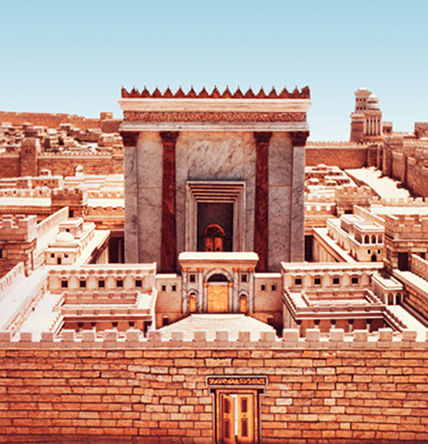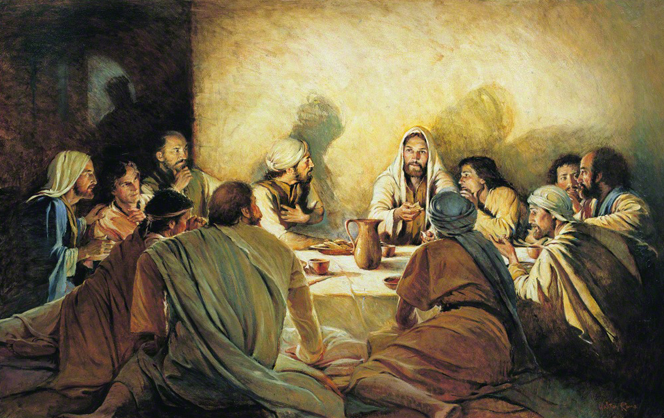 A talk delivered in Sacrament Meeting
A talk delivered in Sacrament MeetingGood morning Brothers and Sisters. Today It is my privilege to combine my interests in Ancient Israelite worship with this year's theme of keeping the Sabbath day holy. While we do not practice our religion in the same way as they did, there are a number of similarities that have deepened my understanding of the Sabbath day, sacred ordinances, and my attitudes toward worship in general. My hope is that we can all be uplifted and edified together as I share some of the lessons I've learned about Sabbath day observance with you.
SIN
If you think of the Law of Moses as a complex and ancient
system of worship, you're not alone. There are a lot of rituals and procedures
that are easy to get confused about, but its overall purpose is really pretty
simple. It outlined certain things that made one unclean, and a process by
which they could become clean again. At its core, the Law of Moses was to point
the Israelites to the future Messiah who would deliver them from sin.
Exodus 34: 7
outlines three types of sin, which are just as common in our day, as they were
to our Israelite ancestors: "Keeping mercy for thousands,
forgiving iniquity and transgression and sin, and that
will by no means clear the guilty;" As I dig a little deeper into these three
types of sin, I hope you'll consider the impact they may have in your lives - I
know I am guilty of them on a regular basis.
The Hebrew word for INIQUITY: (עָוָה -
Avah) means to crook, or twist, and can be translated as "Pervert".
Iniquity occurs when truth or righteousness is twisted. I have observed this in
the world as the pure doctrines of the scriptures as well as the Family
Proclamation have been twisted and turned to suit the carnal ways of men. I
also observe it in my own life on occasion as I try to justify my offenses to
others.
The next type of sin (חטא Chatah) means
to "Miss the Mark". It could be used with regard to hunting or target
practice as well as in spiritual things. Ancient Israelites were often tempted to
worship foreign Gods and dumb idols, while claiming their loyalty to the true
God of Israel. They forgot the first Commandment, which states that "Thou
shalt have no other Gods before me". In disregarding this bullseye
commandment, Israel missed the mark, and sinned.
Are there spiritual targets that we miss in our lives? Maybe
we have good intentions of reading scriptures or serving others, but fail to
follow through? Or perhaps we miss the bullsye's of home and visiting teaching or
temple worship on the targets of our spiritual progression.
The third type of sin is transgression. The
original word means to cross over a boundary. It could be used in the
case of crossing a physical location like a river, property line, or political
border, as well as the crossing of the spiritual boundaries established by the
Lord. Sometimes this word gets translated as "Trespass". This was the
type of sin committed by Adam and Eve, who crossed the known boundary of
partaking of the fruit of the tree of knowledge of good and evil.
The Old Testament gives an account of the sin of a
Sabbath breaker, who simply wanted to gather firewood. Knowing the Law, and yet
breaking it might have been considered a transgression, or perhaps it was
iniquity because he twisted the truth justifying to himself that if he didn't
gather the wood, his family would be cold, or eat their food uncooked. Regardless
of the type of sin, it was a violation of the law. Moses was told that the man
should be stoned to death by the children of Israel. Reading this account made
me consider what transgressions I commit on the Sabbath that might have led to
my stoning in ancient times. Execution may seem like a harsh consequence today,
but the physical death of old times is really a symbol of our spiritual death
when we break the Sabbath today.
There is a fourth type of ancient uncleanliness that has
significant relevance today. If you were touched by a Leper, or accidentally
touched the corpse of an animal or a human, under the Law of Moses you would be
considered unclean. In our culture it would be unfair for someone to suffer
consequences for actions that were not intentional, and yet it required the
same rigorous repentance process as a sin that was committed intentionally.
I am affected by this type of sin as pornography in all
its forms flashes across the internet or grocery store checkout stands. Or in
one of my places of work, I sometimes overhear the exchange of the carnal,
sensual, and devilish things some men do on their weekends or time off. Spiritual
corpses lie all around us. Despite my unwilling participation in these events,
I still become defiled and stand in need of the cleansing and enabling powers
of the atonement.
Ancient Israelites understood the feeling following true
repentance in the same way as the satisfying feeling that followed eating a
delicious meal. Full purification from sin would have required the following three-part
sacrificial process, which once completed brought satisfaction to the
demands of justice and mercy.
The first sacrifice represented justice. Half of the
animal would be symbolically eaten by God through the process of burning, and
the other half would literally be eaten by the priest. Once each portion was
completed, satisfaction of justice was met.
The second animal sacrifice represents consecration. It was
entirely consumed in flame, and neither the priest nor the offender would eat
it as it belonged completely to God. It represents the offender's total and
complete consecration of themselves to God. Our scriptures often refer to this
as "the burnt offering". This sacrifice was offered in the tent of
feast morning and night, every single day of the year, suggesting that
Israelites were the Lord's covenant, and consecrated people. To reinforce the
idea of consecration, this same burnt offering was additionally made twice in
the morning and twice at night on the Sabbath. This doubly reinforced the
importance of the Sabbath Day, and the need to completely consecrate themselves
to the Lord on his Holy day.
The third sacrifice was split three ways: the first
portion was symbolically eaten by God through the smoke of the burnt offering,
the second by the priest, and the third by the offender. This offering satisfied
God, the priest, and the offender, who were once again unified in righteousness.
Because of the goodwill following this offering, it was sometimes offered alone
to simply give thanks to the Lord for his blessings.
This pattern of cleansing is followed in a very familiar Book
of Mormon account. On at least three different occasions, Lehi performed
sacrificial ordinances. The first came when they arrived in the borders by the
Red Sea. On that occasion, they skipped the first offering because no sin or
offense had occurred, so they offered one sacrifice completely to God, followed
by the last or "Thanks offering". (see 1 Nephi 2:
5-7)
The second ordinance came when the sons returned from
retrieving the Brass Plates, but also on that occasion the blood of Laban was
shed. Under the Law of Moses, Nephi would have been considered very unclean
having killed a man and been exposed to his blood. On this occasion, all three
sacrifices were made. (see 1 Nephi 5: 8-9)
The third time came when the sons returned with Ishmael
and his family. If you'll recall, Laman and Lemuel and the sons of Ishmael beat
Nephi (likely to the point of bleeding) and sought to murder him. After
arriving back to Lehi's tent in the wilderness, and probably following some
strong words from their presiding patriarch, Nephi's brothers felt sorry,
repented, and each of the sacrifices were performed (1 Nephi 7: 22).
Though they had left Jerusalem and their temple, the need for the cleansing
brought about through priesthood ordinances remained an important part of their
journey to the Promised Land.
Each of the symbols in ancient ordinances are found in
this room today. Theirs were performed in the soft walled Tabernacle of Feast.
Ours are performed in this hard walled building. Their feast was literal;
ours is literal through the sacred sacrament emblems we took moments ago, but
also spiritual as we feast upon the spirit that abides in this meeting
following true repentance. In both days, sacrificial emblems sit upon the holy
altar, where Priests of the Aaronic Priesthood intercede on behalf of the
offenders. And sitting behind me, we have the presiding officer in the Aaronic
Priesthood, who as a symbol of our Father in Heaven, oversees the ordinances
performed. While some of the technical details differ, the essence of ancient
and modern ordinances is the same, with Jesus Christ's cleansing power at their
core.
Frequent repetition of this ordinance serves as a
reminder of what the Savior has done for all of God's children. Unfortunately,
repetition can also lead to complacency. This was true in ancient times, and
prophets let them know: Isaiah 48:1-2 - Hear ye this, O house of
Jacob, which are called by the name of Israel, and are come forth out of
the waters of Judah, which swear by the name of the Lord,
and make mention of the God of Israel, but not in truth, nor in
righteousness. For they call themselves of the holy city, and stay
themselves upon the God of Israel; The Lord of hosts is his
name.
Isaiah 1:11-12
- To what purpose is the multitude of your sacrifices unto me?
saith the Lord: I am full of the burnt offerings of rams, and the fat of
fed beasts; and I delight not in the blood of bullocks, or of lambs, or
of he goats. When ye come to appear before me, who hath
required this at your hand, to tread my courts?
These verses both say in essence, that while the
Israelites were doing the right things outwardly, their inner convictions were
missing, and instead of worshiping the Lord, they essentially mocked Him.
At times I have been guilty of apathy and going through
the motions. But I have learned that if I walk away from this sacrament meeting
or my temple worship feeling unsatisfied or not uplifted, it isn't because of
some failing on the part of the church leaders, the sacrament program or
speakers, but it is because I came to the altars empty handed, having left the sacrificial
animal of my broken heart and contrite spirit at home.

Thank you for sharing your insights on ancient Israel's sacrificial practices and comparing them to current practices of the day. I cannot tell you how many times I have been complacent when the sacrament is passed to me. I find myself partaking only to later realize that I have completely forgotten to think of Jesus and His great atoning sacrifice.
ReplyDeleteI am curious as to the true reason why we now observe the Sabbath on a Sunday instead of Saturday. I have been reading different sources and pondering this. Was it due to Constantine's orders or changed to focus on the day Christ was resurrected? I've heard a couple different things, any thoughts?
ReplyDeleteAs far as I can tell, the church's official stance on this question is addressed in James Talmage's "Jesus the Christ".
Delete